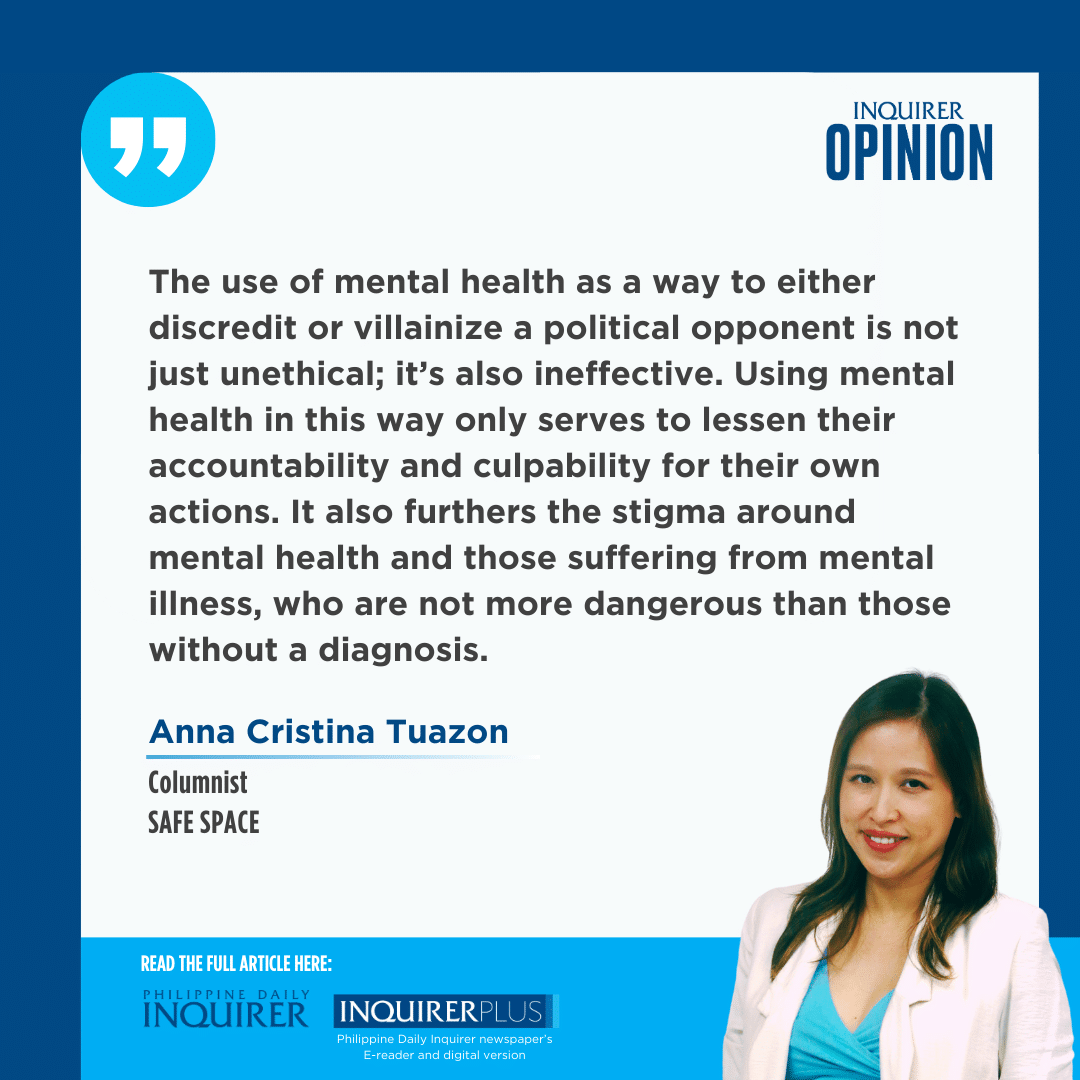Politics scarier than ghosts
For Halloween, it is a tradition for children to dress up as ghosts and monsters to ward off evil spirits. But is there a costume in the world that can ward off evil politics?
As I devoted October to mental health month, I have been remiss in acknowledging the recent political circus. A tense standoff was happening between the President and the Vice President, with the VP making increasingly erratic threats and musings. She threatened to exhume the former dictator’s body, the President’s father, and throw it into the West Philippine Sea (WPS). She also made public statements regarding having daydreams about decapitating the incumbent President. Never mind that it is her own father, former president Rodrigo Duterte, who gave permission for the dictator to be buried in the Libingan ng mga Bayani in the first place. Never mind that the Vice President had remained silent on the issue of China’s aggression in the WPS and only references the contested waters when threatening the current President’s family. Never mind that it is the Vice President’s voting base that helped secure the President Marcos’ return to Malacañang.
These remarks have prompted lawmakers to question her mental health and demanded a psychiatric evaluation. The Vice President did not back down and said she was willing to do it on the condition that all the politicians who criticized her undergo a drug test, an indirect but unsubtle accusation. These happen to be similar accusations her own father had made to his political opponents in the past.
Why is it that when people engage in bad or dangerous behavior, they point it back toward mental health? As unbecoming as the VP’s conduct has been, the decision to publicly call for a psychiatric evaluation is also questionable. The stigma around mental health is bad enough; we shouldn’t use it as a weapon against our rivals.
I caution mental health professionals against providing public opinion on any person’s mental health, even of a public figure. There is a Goldwater rule in our profession, named after a contentious presidential election in the United States, where psychiatrists gave a diagnosis to presidential candidate Barry Goldwater despite not having assessed him personally. The Goldwater rule states that it is unethical to provide a professional opinion on someone you have not personally evaluated through a formal assessment. This is to prevent the misuse of diagnosis as a way to hurt one’s political rivals.
If mental health professionals are not ethically allowed to diagnose, even provisionally, someone they haven’t assessed, what more for nonprofessionals? I caution the public against making hasty hypotheses about someone’s mental health, especially as a way to disparage someone’s character.
Here is my proffer: we can evaluate politicians’ behaviors based on their own merits. No need to diagnose. No need to connect it back to their mental health. Then there is no risk of muddling the issue. Since they are government officials with the duty to represent their office, we can and must take what they say at face value. Leaders must realize they cannot hide behind jokes, rhetoric, or mental health. They must take responsibility for their own words and actions. Given that they represent not just themselves but also their office, they must act with seriousness and earnestness. If the Vice President publicly declares imagining cutting off the President’s head, it makes sense for security officials to take that into consideration when managing the President’s safety.
Meanwhile, in the Senate hearings, former president Duterte freely admitted to many of the accusations surrounding the war on drugs, including having police encourage targets to “fight back,” so that they have the right to kill them and forming the infamous death squad in Davao City when he was mayor. “I offer no apologies, no excuses… I and I alone take full legal responsibility,” he says in the hearing. And yet, even with all these, there are no judicial consequences to his actions and policies, as he brought up in the hearings (albeit as a strange way to justify the rightness of his decisions.) Politicians, such as him, have been so used to not being held accountable for their words that they don’t even bother inhibiting from self-incrimination. And when they are taken to task, they insist that it’s just the manner and style of how they speak. Well then, their manner and style of communicating is, at the very least, unbecoming of their position.
The use of mental health as a way to either discredit or villainize a political opponent is not just unethical; it’s also ineffective. Using mental health in this way only serves to lessen their accountability and culpability for their own actions. It also furthers the stigma around mental health and those suffering from mental illness, who are not more dangerous than those without a diagnosis. Sometimes, bad behavior is just bad behavior.
—————-
aatuazon@up.edu.ph

















